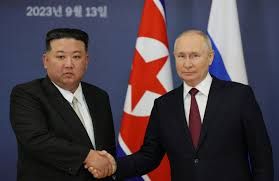Prior to the recent trips to DPRK and [the Socialist Republic of] Vietnam, Putin conducted a two-day visit in [the People’s Republic of] China in late May. In addition to meeting with [President] Xí Jìnpíng, Putin also met with students at the Harbin Institute of Technology, known for its defense research and its work with the People’s Liberation Army.
Unlike [the People’s Republic of] China, the DPRK and [the Socialist Republic of] Vietnam, Russia is not a [people’s republic], and therefore, it does not have a centrally planned economy spearheaded by a pro-working class political party. Russia has been a capitalist country since the counterrevolution in the former Soviet Union in 1991.
U.S. foreign policy since 1992 has explicitly planned U.S. economic and military hegemony in all world regions, which meant planning to weaken and divide Russia so that it could never compete as a rival capitalist power. This included expanding the U.S.-commanded NATO up to the Russian border, conflicts with Russian allies in West Asia and the overthrow of a government in Ukraine in 2014 that was friendly to Moscow.
Putin’s recent trip shows that Russian diplomacy is successfully countering U.S. [neo]imperialism’s aggressive policies.



deleted by creator